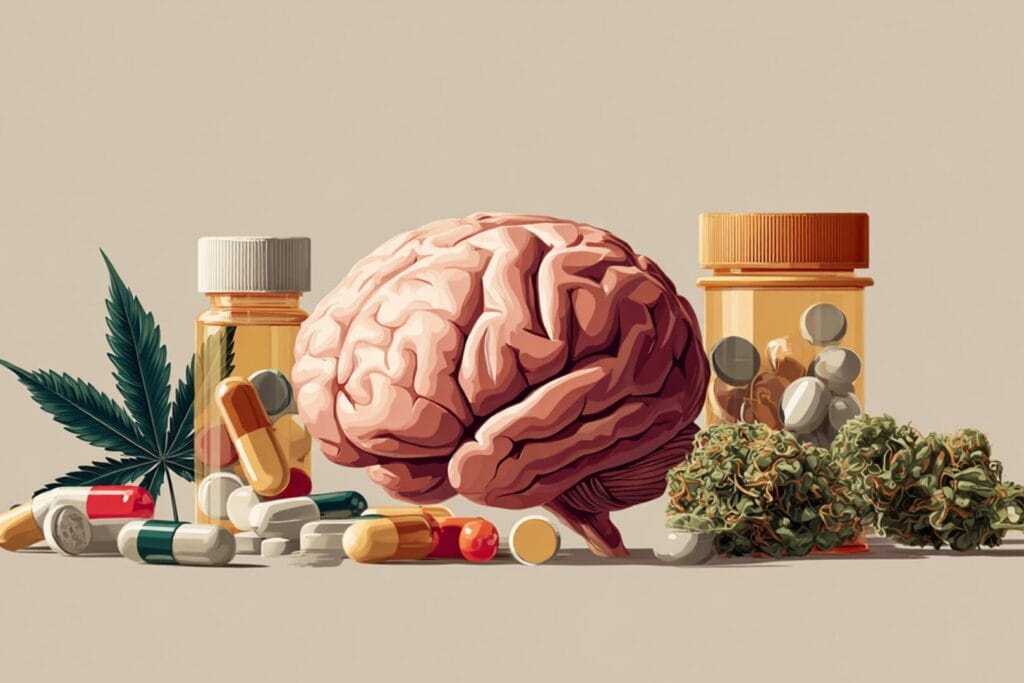Recognizing and addressing addiction isn’t an easy journey, but you’re not alone. Whether you’re someone who is personally experiencing the signs of hydrocodone addiction or you’re concerned about a loved one, you must approach the situation with understanding and care. Regardless of background or circumstance, addiction can affect anyone. Seeking help is the critical first step toward healing and recovery.
The Effects of Hydrocodone
Hydrocodone is a prescription pain reliever categorized as an opioid medicine. It relieves pain, changing how your body perceives and responds to pain signals. Hydrocodone can be prescribed to help manage pain after surgery, an injury, or for chronic health conditions where other pain medicines aren’t helpful.
When you take hydrocodone, it binds to opioid receptors. These receptors are throughout our body and brain and are involved in our perception of pain, pleasure, and reward. When hydrocodone attaches to these sites, it blocks pain signal transmission, leading to pain relief and euphoric feelings.
In the short-term, along with pain relief and euphoria, hydrocodone can cause symptoms like:
- Drowsiness
- Confusion
- Respiratory depression
- Constipation
If you take hydrocodone in large doses or misuse it in any way, it can become especially dangerous.
The Addictiveness of Hydrocodone
All opioids, including hydrocodone, are addictive because they affect the reward system in the brain and also lead to dependence and withdrawal symptoms.
Specific reasons hydrocodone is addictive include:
- When you take hydrocodone, it activates your brain’s reward system and floods it with dopamine. Dopamine is our neurotransmitter that is linked with pleasure and reinforcement of behaviors that lead to pleasure. The dopamine surge creates a sense of euphoria and well-being, which can be reinforced and lead to repeated use.
- With ongoing hydrocodone use, the brain gets tolerant to its effects, and this means higher drug doses are needed to achieve the same level of euphoria or pain relief. You might, once you develop a tolerance, increase how much hydrocodone you take without medical guidance, further raising the risk of addiction.
- Using hydrocodone for some time often leads to physical dependence. When you depend on something, your body adapts to its present. It requires it at that point to function normally. If you rely on hydrocodone and stop using it, you might have withdrawal symptoms like anxiety, insomnia, nausea, and vomiting. These symptoms can further drive your use of hydrocodone to avoid these uncomfortable effects.
- Psychological factors like trauma, stress, or mental health problems influence addiction. Hydrocodone can become a way to deal with emotional stress, and that contributes to a cycle of addiction.
- There are genetic and biological reasons that you might be susceptible to addiction.
- Hydrocodone, for the most part, is readily available, and easy access raises the potential for misuse and addiction.
The Signs of Hydrocodone Abuse vs. Addiction
Hydrocodone abuse is a separate concept from addiction because addiction is a diagnosable disorder. Addiction refers to using hydrocodone excessively or using it recreationally. Abuse can, and often, does develop into an addiction.
Signs of hydrocodone abuse include:
- Taking higher doses than prescribed or what’s medically needed to alleviate pain.
- Taking hydrocodone without a prescription, such as using someone else’s.
- Using hydrocodone for non-medical purposes like achieving relaxation or euphoria.
- Combining it with other substances to enhance the effects.
- Having cravings for it.
- Experiencing challenges socially or occupationally because of the use of hydrocodone.
Hydrocodone addiction is also medically known as an opioid use disorder. An opioid use disorder is a chronic brain disease where you’re compulsively seeking out the substance, even in the face of bad consequences.
Signs of hydrocodone addiction include:
- Tolerance and higher hydrocodone doses to get the same effects you experienced before.
- Experiencing withdrawal symptoms when trying to stop or cut back.
- Being preoccupied with getting and using hydrocodone.
- Losing interest in activities you once enjoyed or prioritized.
- Continued use despite negative effects on your health, work, relationships or finances.
- Not being able to control your use even when you’ve tried to repeatedly.
- Having strong cravings that become a priority.
- Isolation from activities and loved ones should be used hydrocodone instead.
While abusing hydrocodone involves excessive use of it, addiction includes a broader set of criteria. Both conditions have serious consequences and need treatment and intervention.
What Should You Do If You Notice Hydrocodone Addiction Signs?
Whether you see some of the above signs in yourself or someone you care about, there are some steps you can take, including:
- Educate yourself to learn more about hydrocodone addiction and its signs and symptoms. When you understand the nature of addiction, you can approach the situation with clarity and empathy.
- If you notice addiction signs in a loved one, show your concern in a non-judgmental and caring way. Let them know you’re there to support them.
- Encourage open communication and be a safe space for your loved one to have honest conversations with you about their use of hydrocodone. Don’t be critical, but instead, try to be encouraging.
- Offer to help your loved one find resources and support to address addiction, like assisting them in researching treatment options or providing emotional support as they’re going through treatment and recovery.
It’s extremely important to encourage your loved one to seek professional help or that you do so yourself.
Hydrocodone addiction treatment programs are available on an inpatient and outpatient basis. Depending on your needs, you might start with a medically supervised detox. From there, you can move into the next phases of your treatment, including counseling, behavioral therapies, and holistic approaches.
Untreated hydrocodone addiction tends to get worse progressively. It can turn into heroin use or the use of other more potent opioids, and the consequences continue to stack on one another.
The sooner you can get help for the signs of addiction, the better your outcomes are likely to be, or those of someone you love. We can help, so contact us to learn more.
Comprehensive Treatment for Hydrocodone Addiction at San Diego Detox
Overcoming hydrocodone addiction requires a multifaceted approach that addresses both the physical and psychological aspects of dependency. At San Diego Detox, we offer a comprehensive suite of evidence-based treatments tailored to support individuals at every stage of their recovery journey.
Medical Detoxification: Our medically supervised detox program ensures a safe and comfortable withdrawal process, managing symptoms that often accompany hydrocodone cessation.
Medication-Assisted Treatment (MAT): We utilize FDA-approved medications to alleviate withdrawal symptoms and reduce cravings, facilitating a smoother transition into sobriety.
Residential Care: Our residential treatment provides a structured environment where clients receive continuous support, allowing them to focus entirely on their recovery without external distractions.
Dual Diagnosis Treatment: Recognizing that addiction often co-occurs with mental health disorders, our dual diagnosis program addresses both issues concurrently, promoting holistic healing.
Individual and Group Therapy: Through personalized therapy sessions and group discussions, clients explore the underlying causes of their addiction, develop coping strategies, and build a supportive community.
Holistic Therapies: We incorporate holistic practices such as yoga and meditation to enhance physical well-being and mental clarity, supporting overall recovery.
Located in the serene landscapes of San Diego, we combine luxurious accommodations with top-tier medical care. Our dedicated team is committed to providing compassionate, individualized treatment to guide you toward lasting recovery.
Take the First Step Today
If you or a loved one is struggling with hydrocodone addiction, don’t wait to seek help. Contact San Diego Detox to learn more about our programs and begin your journey to recovery.
Frequently Asked Questions (FAQs)
Hydrocodone is a prescription opioid used to relieve moderate to severe pain and sometimes suppress coughing. It can be addictive because it binds to opioid receptors in the brain — producing pain relief and euphoria — and over time may lead to physical dependence, tolerance, and compulsive use.
Signs of hydrocodone addiction may include: needing increasing doses to get the same effect; withdrawal symptoms (anxiety, nausea, insomnia) when stopping; strong cravings; preoccupation with obtaining or using the drug; neglecting responsibilities or social activities; isolation; and continued use despite negative consequences to health, work, relationships, or finances.
Yes — long-term misuse or addiction to hydrocodone can lead to lasting changes in brain chemistry (impacting mood, motivation, thought patterns), increased risk of organ damage (such as liver or kidney harm, especially with combination products), respiratory issues, and increased risk of overdose.
If you notice addiction signs, it’s important to seek professional help. Options include medically supervised detox, behavioral therapy, holistic therapy, or inpatient/outpatient treatment programs. Early intervention improves outcomes.







